高中英语二轮复习语法常用动词时态课件(38.PPT)
文档属性
| 名称 | 高中英语二轮复习语法常用动词时态课件(38.PPT) |  | |
| 格式 | zip | ||
| 文件大小 | 1.9MB | ||
| 资源类型 | 教案 | ||
| 版本资源 | 通用版 | ||
| 科目 | 英语 | ||
| 更新时间 | 2019-03-05 16:16:41 | ||
图片预览

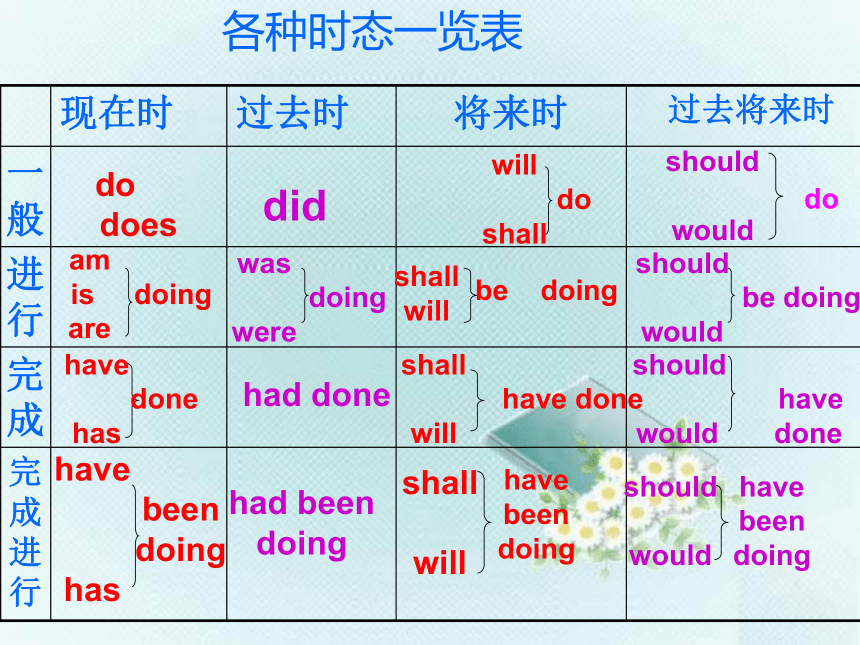
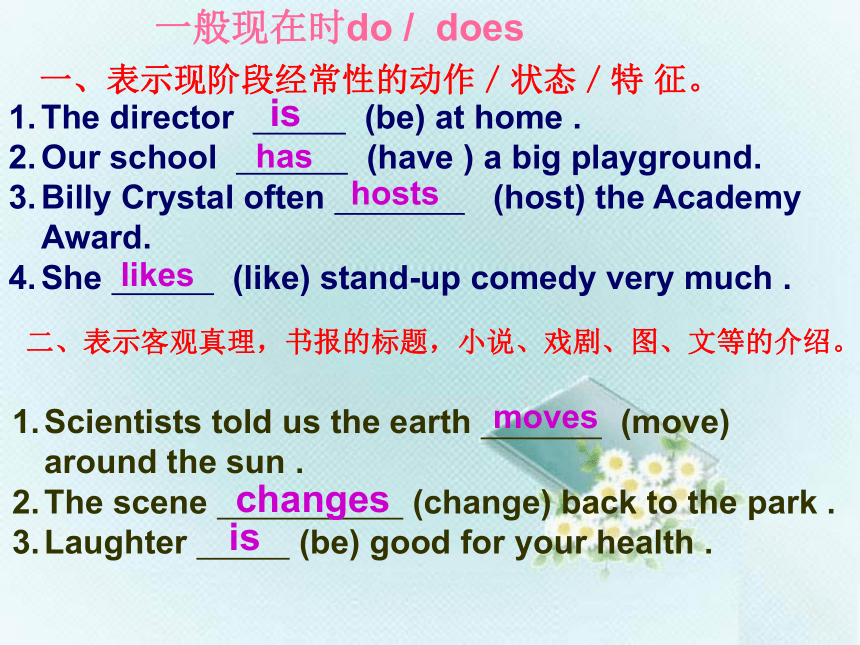
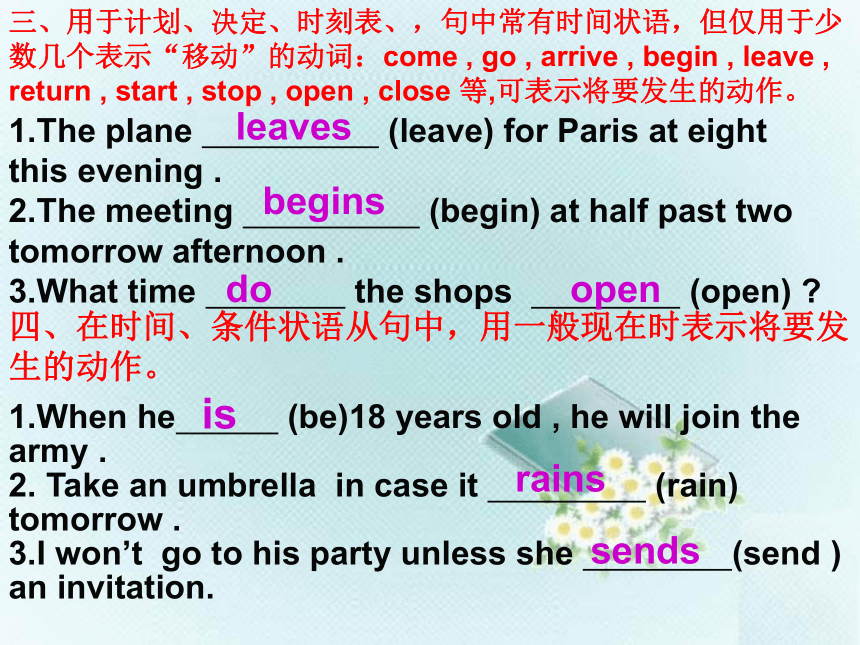
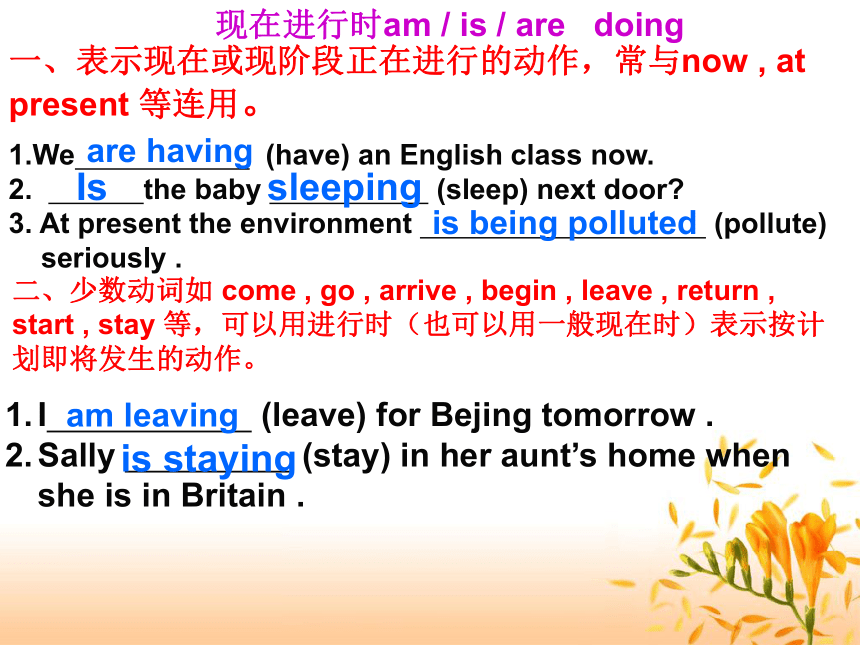
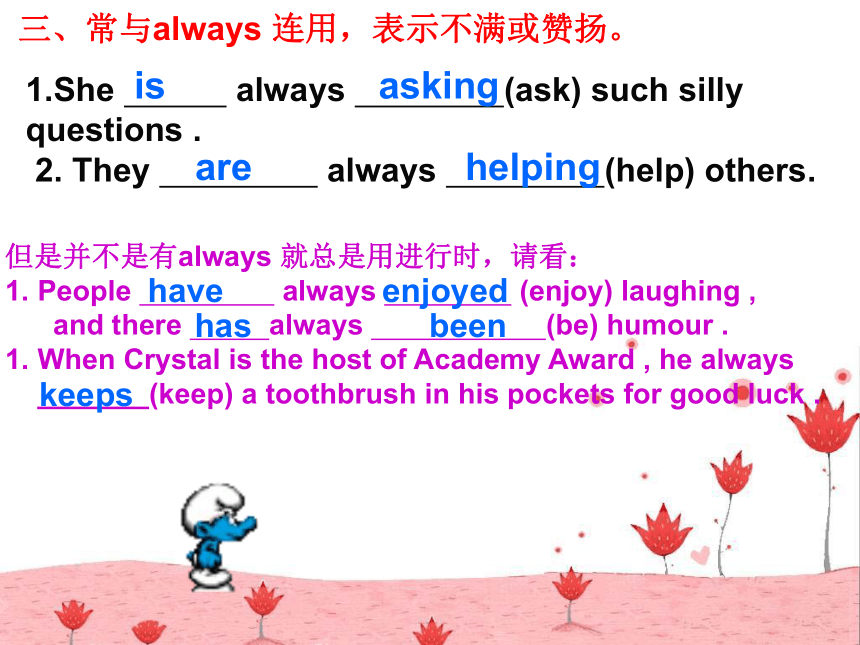

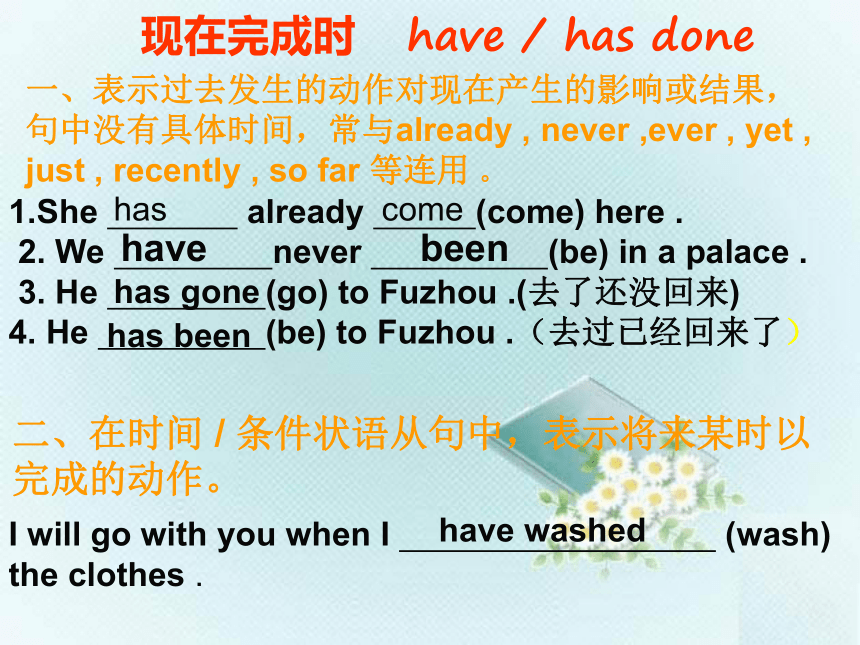


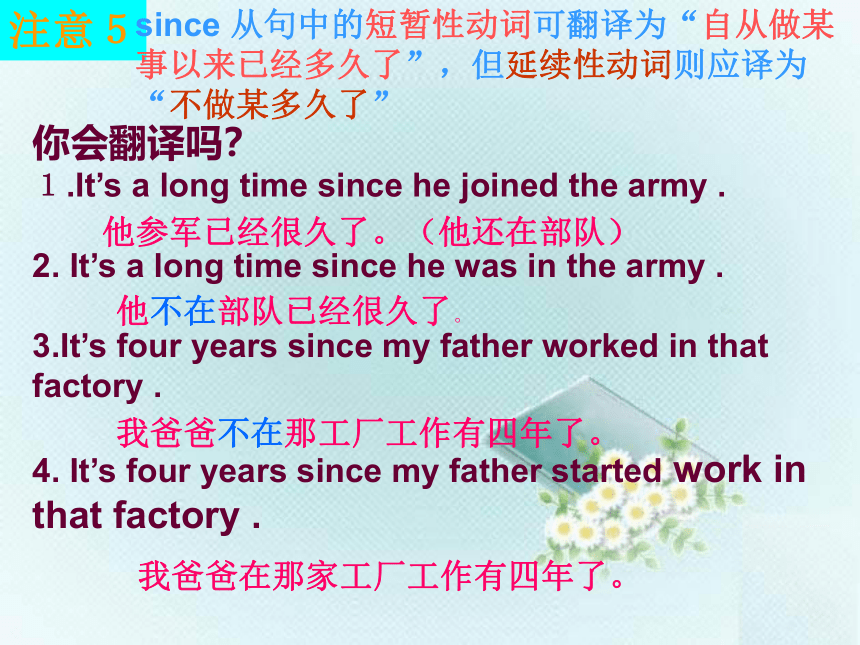
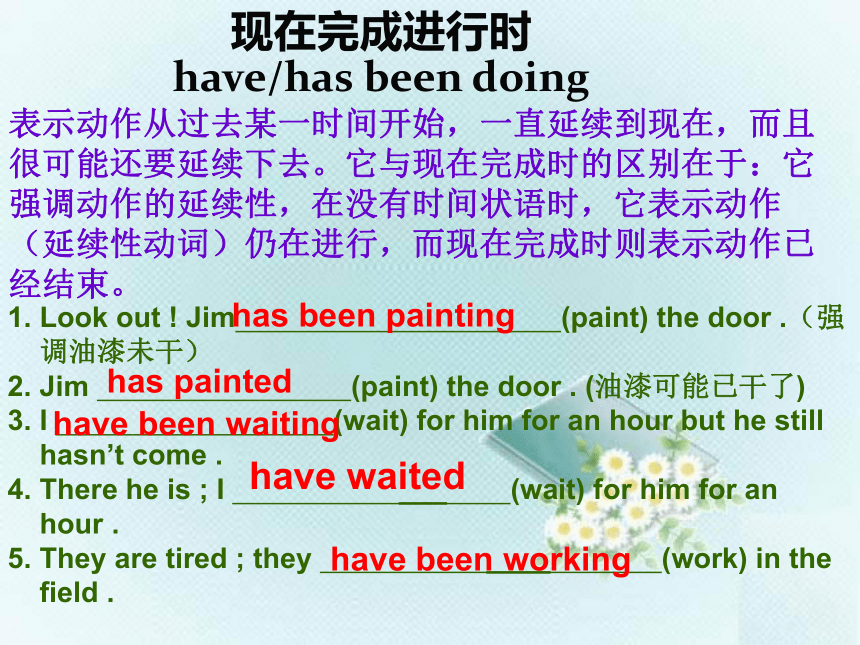
文档简介
动词时态
各种时态一览表
do
does
did
will
do
shall
should
would
am
is doing
are
was
doing
were
shall
will
should
be doing
would
have
done
has
had done
shall
have done
will
should
have
would done
have
been
doing
has
had been doing
shall
will
have been doing
have been doing
should
would
be doing
do
现在时 过去时 将来时 过去将来时
一般
进行
完成
完成进行
一般现在时do / does
一、表示现阶段经常性的动作/状态/特 征。
The director (be) at home .
Our school (have ) a big playground.
Billy Crystal often (host) the Academy Award.
She (like) stand-up comedy very much .
二、表示客观真理,书报的标题,小说、戏剧、图、文等的介绍。
Scientists told us the earth (move) around the sun .
The scene (change) back to the park .
Laughter (be) good for your health .
is
has
hosts
likes
moves
changes
is
三、用于计划、决定、时刻表、,句中常有时间状语,但仅用于少数几个表示“移动”的动词:come , go , arrive , begin , leave , return , start , stop , open , close 等,可表示将要发生的动作。
1.The plane (leave) for Paris at eight this evening .
2.The meeting (begin) at half past two tomorrow afternoon .
3.What time the shops (open) ?
四、在时间、条件状语从句中,用一般现在时表示将要发生的动作。
1.When he (be)18 years old , he will join the army .
2. Take an umbrella in case it (rain) tomorrow .
3.I won’t go to his party unless she (send ) an invitation.
leaves
begins
do open
is
rains
sends
现在进行时am / is / are doing
一、表示现在或现阶段正在进行的动作,常与now , at present 等连用。
1.We (have) an English class now.
2. the baby (sleep) next door?
3. At present the environment (pollute) seriously .
二、少数动词如 come , go , arrive , begin , leave , return , start , stay 等,可以用进行时(也可以用一般现在时)表示按计划即将发生的动作。
I (leave) for Bejing tomorrow .
Sally (stay) in her aunt’s home when she is in Britain .
are having
Is sleeping
is being polluted
am leaving
is staying
三、常与always 连用,表示不满或赞扬。
1.She always (ask) such silly questions .
2. They always (help) others.
但是并不是有always 就总是用进行时,请看:
People always (enjoy) laughing ,
and there always (be) humour .
When Crystal is the host of Academy Award , he always _______(keep) a toothbrush in his pockets for good luck .
is asking
are helping
have enjoyed
has been
keeps
表示感觉、情感、心理状态的动词如smell , taste , sound ,look , feel , need hear ,like ,love, hate , know , want , wish , forget 等及be表示“是”、have 表示“有”时,不能用于进行时。
不能说:
1.We are wanting to take part in the lecture .
2. The food is tasting nice .
3.Kate is knowing the answers.
注意!
现在完成时 have / has done
一、表示过去发生的动作对现在产生的影响或结果,句中没有具体时间,常与already , never ,ever , yet , just , recently , so far 等连用 。
1.She already (come) here .
2. We never (be) in a palace .
3. He (go) to Fuzhou .(去了还没回来)
4. He (be) to Fuzhou .(去过已经回来了)
二、在时间 / 条件状语从句中,表示将来某时以完成的动作。
I will go with you when I (wash) the clothes .
has come
have been
has gone
has been
have washed
三、表示过去开始的动作持续到现在,也许还继续持续下去,常和since ,for 表示一段时间的状语,或so far , now , recently ,lately 等词连用。
1.So far, Crystal (host ) the show eight times .
2.We (study) English for seven years (since 1999 ) .
3.Now I (finish) my homework .
have studied
have finished
has hosted
注意1
短暂性动词(如:come ,go ,return , die , join , marry , buy , leave, get, begin , catch , end , finish 等 )可以用于完成时,但不能与for ,since 构成的短语连用。如:
不能说:She has come here for two hours . 只能说 :She has been here for two hours .
或者说 : She came here two hours ago .
注意2
since 引导的从只能用一般过去时,主句要用现在完成时。如:
We (be) friends ever since we (meet ) at school .
注意3
have been
met
It’s the first / second time that I have been to a foreign country.
这个句型常用现在完成时。
你会翻译吗?
1.It’s a long time since he joined the army .
2. It’s a long time since he was in the army .
3.It’s four years since my father worked in that factory .
4. It’s four years since my father started work in that factory .
他参军已经很久了。(他还在部队)
他不在部队已经很久了。
我爸爸不在那工厂工作有四年了。
我爸爸在那家工厂工作有四年了。
注意5
since 从句中的短暂性动词可翻译为“自从做某事以来已经多久了”,但延续性动词则应译为“不做某多久了”
现在完成进行时
have/has been doing
表示动作从过去某一时间开始,一直延续到现在,而且很可能还要延续下去。它与现在完成时的区别在于:它强调动作的延续性,在没有时间状语时,它表示动作(延续性动词)仍在进行,而现在完成时则表示动作已经结束。
Look out ! Jim (paint) the door .(强调油漆未干)
Jim (paint) the door . (油漆可能已干了)
I (wait) for him for an hour but he still hasn’t come .
There he is ; I ___ (wait) for him for an hour .
They are tired ; they ____ (work) in the field .
has been painting
has painted
have been waiting
have waited
have been working
Exercises
( )1.A: Are the Browns still in Australia ?
B: . It’s years since they lived there .
A. Yes B. No C. I’m not sure . D. Of course
( )2.When tomorrow , I will serve tea to him .
A. he will come B. does he come
C. he comes D . will he come
( )3.The police searching our neighbor’s house . What do you suppose ?
A. are ; has happened B. is ; is happening
C. is ; would happen D. were ; did happen
( )4.If you him , please go to his home early .
A. will help B. helps C. help D. don’t help
( )5. Why tired ? I the house the whole morning .
A. are you ; have cleaned B. do you ; was cleaning
C. do you look ; have been cleaning
D. are you looking ; am cleaning
B
C
A
A
C
一般过去时 did ( didn’t do)
或 were ( weren’t) / was ( wasn’t)
记住常用的动词过去式和过去分词
一、只表示动作发生在过去,或过去常发生,与现在无关。常与 yesterday , last week,two months /years ago 等连用。而现在完成时则强调过去发生的事情对现在产生的结果或影响。
I ( watch) the comedy before .
I (watch) the comedy last year.
have watched
watched
二、用when / where / how 提出的疑问句及其答语要用一般过去时。
A: Wow, What a big bag ! What you (buy) ?
B: I (buy) a lot of books and food .
A: When you (buy) them ?
B: I (buy) them yesterday morning .
A: Where you (buy) them ?
B: I (buy) them in a supermarket .
But I (not buy) any clothes in it . They are too expensive .So I _________________any clothes .
A: How you (go) ?
B: I (take) a motorbike .
have bought
have bought
did buy
bought
did buy
bought
did go
took
didn’t buy
haven’t bought
三、一般过去时在虚拟语气中的应用
用过去式表示对现在事情的假设
固定句型:It’s ( high / about ) time (that) sb. did sth. 表示“(早就)到了该做某事的时候了”
If I (have) time , I would attend the lecture .
I wish it (be) spring all the year round .
He looks as if he (be) an artist .
If it (be) not for the rain ,the crops would die .
It’s (high) time we (that) (leave) .
2.It’s (about) time he (that) ____________(fetch) his son from school .
had
were
were
were
left
fetched
用正确时态填空:
1.a) ------I can’t find my glasses. ______ you ______ (see) them?
b) ------Yes. You ______ (leave) them in the car yesterday.
?
2.The tape recorder ______ (be) out of order last week.
We ______ (have) it repaired the day before yesterday.
It ______ (be) in good condition ever since.
?
3. a) -----How ______you ______ (be) since I ______ (see) you last ?
b) -----Very well, thank you. And you?
?
4. It ____________ (be) ten years since we ______ (part).
?
Have
seen
was
had
has been
have been
saw
is/ has been
parted
left
?5. a) -----We ________________ (not see) you for ages! Where ________you ________ (be)?
b) -----I _______________(be) to Scotland?
?
6. I can’t lock the door. I ________ ________ (lose) my key.
I ________ (lose) it while I ________ (be) out.
?
7. We _______________ (know) each other since we ________ (be) boys.
You ________________ (not do) what you ________ (promise) to do.
haven’t seen
have been
have been
have lost
lost was
have known
haven’t done
promised
were
过去进行时was / were doing
一、表示过去某一时刻或某一阶段正在进行的动作。
What she (do) this time yesterday ? She (practise) gym.
In 2000 they (study) in a university .
二、用于故事中情节、场面的描写。
One morning , a hunter ( walk) through a forest when he met a bear .
All the students were busy this afternoon . Some (sweep) the floor .
Some (carry) water .
Others (clean) the desks and the doors .
was doing
was practising
were studying
was walking
were sweeping
were cleaning
were carrying
三、有些表示“移动”的动词:go , come , leave , arrive , set out , take off 等,的过去进行式常表示过去将来时。
1. John told us they (leave) for London the next week and that they (come) to say goodbye that evening .
四、比较一般过去时和过去进行时:
1. He was writing a letter yesterday evening .
2.He wrote a letter yesterday evening .
你知道这两句的意思有什么区别吗?
1、他昨晚一直在写信。(可能还没写完)
2、他昨晚写了一封信。(写完了)
were leaving
were coming
Exercises
1. A: Look , where are you going ? You are walking in the wrong direction.
B: Oh , I .
A. didn’t notice B. wasn’t noticing
C. haven’t noticed D. am not noticing
2. A: You needn’t have paid for it .
B: You are right . Nobody the tickets .
A. was collecting . B. collected
C. had collected D . will collect
3. A: Ouch ! You are standing on my foot .
B: I’m sorry , but I to
A. don’t mean B. haven’t mean
C. am not meaning D. didn’t mean
用正确时态填空:
1. He went (go) towards the fire, which still was s ______________(smoke).
2. While my father was looking (look) through the evening paper, he suddenly let (let) out a cry of surprise.
3. When I entered (enter) the room, he didn't see (not see) me. For he was reading (read) something with great interest.
4. When we arrived (arrive) at the village, it was getting (get) dark, and the wind was blowing (blow) hard.
5. I didn't know (not know) you were waiting _______________(wait) for me here.
went
was smoking
was looking
let
entered
didn't see
was reading
arrived
was getting
was blowing
didn’t know
were waiting
过去完成时 had done
一、表示过去某一时刻或某一事件之前已经发生或完成的动作、状态,即“过去的过去”,可译成“在那之前已经做了某事”。常用 by , before , when 等引起的时间状语。
By the end of last week we (study) five books .
I (reach) the station before six o’clock .
You (be) in this school for a years before / when I came here .
had studied
had reached
had been
二、hope , wish , expect , think , intend , mean , suppose 等的过去完成时的含义是指“过去没有实现的愿望、打算、计划“,也表示”失望“或”惋惜“等情绪。后面常有but引起的句子作补充说明。
1.We (hope) that you would be able to visit us,but you didn’t .
2.She (think) of adopting an orphan , but was prevented from doing so .
3.They (mean) to see us off at the air port , but they got there too late
had hoped
had thought
had meant
If you (come) yesterday , you would have met him .
We wish we (arrive) there two hours earlier .
He speaks English so fluently as if he (study) English in England before .
Only if I (take) his advice .
三、在虚拟语气中 had done 表示对过去事情的假设。
四、在 no sooner …than … 和 hardly / scarcely / rarely …when 句型中表示“刚…就…”,主句的谓语动词用 had done(过去完成时) ,从句中用did(一般过去时) 。
I hardly (enter) the room when I (hear) a loud noise .
We no sooner (reach) home than it (begin) to rain .
had come
had arrived
had studied
had taken
had entered
heard
had reached
began
用一般过去时态或过去完成时态填空:
1. The boy _____ (die) in the fight . A bullet ______________(pass) through his chest.
2.The task _____ (be) much harder than we ______________(expect).
3. He _____ _____ (not feel) so well, as he _______________ (catch) a bad cold.
4. She _____ _____ (be given) a gold medal for what she _____________ (do) for the country.
5. Father ______________ (cannot go) out that night, for he ____________________ (promise) to wait for Ma Ying at home.
6. We _______________ (not know) you ______________ (be) so busy the past two years.
7. He __________ hardly __________ (reach) home when it __________(begin) to rain.
died
had passed
was
had expected
didn’t feel
had caught
was given
had done
couldn’t go
had promised
didn’t know
had been
had reached
began
一般将来时
六种表现形式
一、will / shall do
will be
表示将要发生的动作或情况:
When you (be) able to give us an answer ?
I (think) it over .
We ( not be) free tomorrow .
The agreement (come) into force next spring .
The meeting (not last) long ; just have a little patience .
when I (make) the copy ?
will think
shall /will not be
will come
won’t last
shall make
二、be going to do
表示打算、准备做的事
How you (spend) your holidays ?
He (be) a host after he graduates .
Look at the cIouds .I think it (rain) soon .
Watch out ! The basin of flowers (fall) .
I feel terrible ; I (throw) up .
There (be) a lot of trouble about this .
are going to spend
is going to be
is going to rain
am going to throw
is going to fall
表示现在已有迹象表明即将发生、肯定要发生的事
is going to be
愿意
be going to 与 will 的区别
两者经常可以换用,但be going to 比较口语化,will 多用于书面语 : What will / is going to happen now ?
如果是事先经过考虑的就用 be going to , 否则就用 will
She (make) you a dress .
She has bought some cloth ; she (make) you a dress .
be going to 可用以条件分句, 表示将来时, 而 will 则不能,但will 作情态动词表示“愿意”时除外。
1.If you (call) at Mr. William’s office ,please send a message .
(如果你要到威廉姆先生的办公室去的话,请你给他捎个信。)
2.If he (listen) to me , I will give him some advice .(如果他愿意听的话,我将给他提几条忠告。)
will make
is going to make
are going to call
will listen
三、be doing 表示将来时,主要表示按计划、安排将要发生的动作或事。请看前面第4张:现在进行时
四、一般现在时表示将来,仅限于某些动词,表示按计划安排要发生的事。请看前面第3张:一般现在时
五、be to do 表示按计划安排要发生的事或用来征求对方意见,也常用于宣传官方的计划或决定,以及禁止、命令等。
1. We (produce) more electricity this year .
I (go) on with the work ?
= Shall I go on with the work ?
3.When they (hand) in their plan ?
4.The park (not open) to the public after six o’clock .
5.Team One (get) some water ;
Team Two (dig) holes and Team Three (plant) the young trees .
6.The letter (hand) to him in person .
are to produce
Am to go
are to hand
is not to open
are to get
are to dig
are to plant
is to be handed
be to do 还可以表示
一、想要做的事
二、后来将(注定)要发生的事
He (regret) this decision .(这决定他将来是会后悔的。)
The worst still (come).(最糟糕的情况还在后头。)
In the next ten years they (work) together in the same unit .(以后十年他们将在一个单位一道工作。)
I must continue to learn if I (make) further progress .
If we (succeed) , we must rely on the masses .
am to make
are to succeed
is to regret
is to come
are to work
六、be about to 表示即将发生某事,因为它本身带有“即将”之意,所以不能与表示将来的时间状语连用,但常与when 引起的时间状语连用,表示“即将做某事时突然另一事发生了”。它也不带有说话人的主观打算。
He (retire) .
2. We (leave) when the telephone rang .
3. Autumn harvest (start) .
不能说:1.The train is about to leave at 5:20 .
2. She is about to attend the meeting this afternoon.
可以说:1.The train is about to leave .
2.She is about to attend the meeting .
is about to retire
were about to leave
is about to start
将来进行时will be doing
表示将来某一时间正在进行的动作。一般不表示意愿,常表示已安排好之事,给人一种期待之感。
1.What you (do) this time tomorrow ?
2.We (live) in London next year .
3. The rocket (leave) in a second .
4. I (wait) for you then .
Will be doing
Will be living
Will be leaving
Will be waiting
将来完成时 will / shall have done
表示到将来某个时候已经完成的动作或已有的结果。
I (finish) reading the book by the end of this week .
Before long , he (forget) all about this matter .
they (do) with their talking ? (他们的谈话还有完没有?)
When I have done that , I (do) all was supposed to do .
If you come at 6 o’clock , we (not return) from work .
shall have finished
will have forgot
Will have done
shall have done
will have not returned
时态综合比较填空:
1. You ______ (feel) better when you__________(take) the medicine.
2.She said we ____________ (may keep) the books as long as we _________ (like).
3. Please wake me up if I _____ still __________ (sheep) when you ___________ (come).
4. My sister ______________(learn) English since she _____ (be) a child. She ____________ (speak) English fluently now.
5. My uncle ____________ (come) to see us. He ____________ (arrive) here a few days ago.
6. He ____________ (start) for Sydney tomorrow morning.
7. He ______ (break) his glasses when he _________ in a football match.
8.Please come tomorrow afternoon . I ____________ (have) a meeting tomorrow morning .
will feel
have taken
might keep
liked
am sleeping
come
has been learning
was
speaks
has come
arrived
will start/ is starting
broke
was playing
will be having
Goodbye
各种时态一览表
do
does
did
will
do
shall
should
would
am
is doing
are
was
doing
were
shall
will
should
be doing
would
have
done
has
had done
shall
have done
will
should
have
would done
have
been
doing
has
had been doing
shall
will
have been doing
have been doing
should
would
be doing
do
现在时 过去时 将来时 过去将来时
一般
进行
完成
完成进行
一般现在时do / does
一、表示现阶段经常性的动作/状态/特 征。
The director (be) at home .
Our school (have ) a big playground.
Billy Crystal often (host) the Academy Award.
She (like) stand-up comedy very much .
二、表示客观真理,书报的标题,小说、戏剧、图、文等的介绍。
Scientists told us the earth (move) around the sun .
The scene (change) back to the park .
Laughter (be) good for your health .
is
has
hosts
likes
moves
changes
is
三、用于计划、决定、时刻表、,句中常有时间状语,但仅用于少数几个表示“移动”的动词:come , go , arrive , begin , leave , return , start , stop , open , close 等,可表示将要发生的动作。
1.The plane (leave) for Paris at eight this evening .
2.The meeting (begin) at half past two tomorrow afternoon .
3.What time the shops (open) ?
四、在时间、条件状语从句中,用一般现在时表示将要发生的动作。
1.When he (be)18 years old , he will join the army .
2. Take an umbrella in case it (rain) tomorrow .
3.I won’t go to his party unless she (send ) an invitation.
leaves
begins
do open
is
rains
sends
现在进行时am / is / are doing
一、表示现在或现阶段正在进行的动作,常与now , at present 等连用。
1.We (have) an English class now.
2. the baby (sleep) next door?
3. At present the environment (pollute) seriously .
二、少数动词如 come , go , arrive , begin , leave , return , start , stay 等,可以用进行时(也可以用一般现在时)表示按计划即将发生的动作。
I (leave) for Bejing tomorrow .
Sally (stay) in her aunt’s home when she is in Britain .
are having
Is sleeping
is being polluted
am leaving
is staying
三、常与always 连用,表示不满或赞扬。
1.She always (ask) such silly questions .
2. They always (help) others.
但是并不是有always 就总是用进行时,请看:
People always (enjoy) laughing ,
and there always (be) humour .
When Crystal is the host of Academy Award , he always _______(keep) a toothbrush in his pockets for good luck .
is asking
are helping
have enjoyed
has been
keeps
表示感觉、情感、心理状态的动词如smell , taste , sound ,look , feel , need hear ,like ,love, hate , know , want , wish , forget 等及be表示“是”、have 表示“有”时,不能用于进行时。
不能说:
1.We are wanting to take part in the lecture .
2. The food is tasting nice .
3.Kate is knowing the answers.
注意!
现在完成时 have / has done
一、表示过去发生的动作对现在产生的影响或结果,句中没有具体时间,常与already , never ,ever , yet , just , recently , so far 等连用 。
1.She already (come) here .
2. We never (be) in a palace .
3. He (go) to Fuzhou .(去了还没回来)
4. He (be) to Fuzhou .(去过已经回来了)
二、在时间 / 条件状语从句中,表示将来某时以完成的动作。
I will go with you when I (wash) the clothes .
has come
have been
has gone
has been
have washed
三、表示过去开始的动作持续到现在,也许还继续持续下去,常和since ,for 表示一段时间的状语,或so far , now , recently ,lately 等词连用。
1.So far, Crystal (host ) the show eight times .
2.We (study) English for seven years (since 1999 ) .
3.Now I (finish) my homework .
have studied
have finished
has hosted
注意1
短暂性动词(如:come ,go ,return , die , join , marry , buy , leave, get, begin , catch , end , finish 等 )可以用于完成时,但不能与for ,since 构成的短语连用。如:
不能说:She has come here for two hours . 只能说 :She has been here for two hours .
或者说 : She came here two hours ago .
注意2
since 引导的从只能用一般过去时,主句要用现在完成时。如:
We (be) friends ever since we (meet ) at school .
注意3
have been
met
It’s the first / second time that I have been to a foreign country.
这个句型常用现在完成时。
你会翻译吗?
1.It’s a long time since he joined the army .
2. It’s a long time since he was in the army .
3.It’s four years since my father worked in that factory .
4. It’s four years since my father started work in that factory .
他参军已经很久了。(他还在部队)
他不在部队已经很久了。
我爸爸不在那工厂工作有四年了。
我爸爸在那家工厂工作有四年了。
注意5
since 从句中的短暂性动词可翻译为“自从做某事以来已经多久了”,但延续性动词则应译为“不做某多久了”
现在完成进行时
have/has been doing
表示动作从过去某一时间开始,一直延续到现在,而且很可能还要延续下去。它与现在完成时的区别在于:它强调动作的延续性,在没有时间状语时,它表示动作(延续性动词)仍在进行,而现在完成时则表示动作已经结束。
Look out ! Jim (paint) the door .(强调油漆未干)
Jim (paint) the door . (油漆可能已干了)
I (wait) for him for an hour but he still hasn’t come .
There he is ; I ___ (wait) for him for an hour .
They are tired ; they ____ (work) in the field .
has been painting
has painted
have been waiting
have waited
have been working
Exercises
( )1.A: Are the Browns still in Australia ?
B: . It’s years since they lived there .
A. Yes B. No C. I’m not sure . D. Of course
( )2.When tomorrow , I will serve tea to him .
A. he will come B. does he come
C. he comes D . will he come
( )3.The police searching our neighbor’s house . What do you suppose ?
A. are ; has happened B. is ; is happening
C. is ; would happen D. were ; did happen
( )4.If you him , please go to his home early .
A. will help B. helps C. help D. don’t help
( )5. Why tired ? I the house the whole morning .
A. are you ; have cleaned B. do you ; was cleaning
C. do you look ; have been cleaning
D. are you looking ; am cleaning
B
C
A
A
C
一般过去时 did ( didn’t do)
或 were ( weren’t) / was ( wasn’t)
记住常用的动词过去式和过去分词
一、只表示动作发生在过去,或过去常发生,与现在无关。常与 yesterday , last week,two months /years ago 等连用。而现在完成时则强调过去发生的事情对现在产生的结果或影响。
I ( watch) the comedy before .
I (watch) the comedy last year.
have watched
watched
二、用when / where / how 提出的疑问句及其答语要用一般过去时。
A: Wow, What a big bag ! What you (buy) ?
B: I (buy) a lot of books and food .
A: When you (buy) them ?
B: I (buy) them yesterday morning .
A: Where you (buy) them ?
B: I (buy) them in a supermarket .
But I (not buy) any clothes in it . They are too expensive .So I _________________any clothes .
A: How you (go) ?
B: I (take) a motorbike .
have bought
have bought
did buy
bought
did buy
bought
did go
took
didn’t buy
haven’t bought
三、一般过去时在虚拟语气中的应用
用过去式表示对现在事情的假设
固定句型:It’s ( high / about ) time (that) sb. did sth. 表示“(早就)到了该做某事的时候了”
If I (have) time , I would attend the lecture .
I wish it (be) spring all the year round .
He looks as if he (be) an artist .
If it (be) not for the rain ,the crops would die .
It’s (high) time we (that) (leave) .
2.It’s (about) time he (that) ____________(fetch) his son from school .
had
were
were
were
left
fetched
用正确时态填空:
1.a) ------I can’t find my glasses. ______ you ______ (see) them?
b) ------Yes. You ______ (leave) them in the car yesterday.
?
2.The tape recorder ______ (be) out of order last week.
We ______ (have) it repaired the day before yesterday.
It ______ (be) in good condition ever since.
?
3. a) -----How ______you ______ (be) since I ______ (see) you last ?
b) -----Very well, thank you. And you?
?
4. It ____________ (be) ten years since we ______ (part).
?
Have
seen
was
had
has been
have been
saw
is/ has been
parted
left
?5. a) -----We ________________ (not see) you for ages! Where ________you ________ (be)?
b) -----I _______________(be) to Scotland?
?
6. I can’t lock the door. I ________ ________ (lose) my key.
I ________ (lose) it while I ________ (be) out.
?
7. We _______________ (know) each other since we ________ (be) boys.
You ________________ (not do) what you ________ (promise) to do.
haven’t seen
have been
have been
have lost
lost was
have known
haven’t done
promised
were
过去进行时was / were doing
一、表示过去某一时刻或某一阶段正在进行的动作。
What she (do) this time yesterday ? She (practise) gym.
In 2000 they (study) in a university .
二、用于故事中情节、场面的描写。
One morning , a hunter ( walk) through a forest when he met a bear .
All the students were busy this afternoon . Some (sweep) the floor .
Some (carry) water .
Others (clean) the desks and the doors .
was doing
was practising
were studying
was walking
were sweeping
were cleaning
were carrying
三、有些表示“移动”的动词:go , come , leave , arrive , set out , take off 等,的过去进行式常表示过去将来时。
1. John told us they (leave) for London the next week and that they (come) to say goodbye that evening .
四、比较一般过去时和过去进行时:
1. He was writing a letter yesterday evening .
2.He wrote a letter yesterday evening .
你知道这两句的意思有什么区别吗?
1、他昨晚一直在写信。(可能还没写完)
2、他昨晚写了一封信。(写完了)
were leaving
were coming
Exercises
1. A: Look , where are you going ? You are walking in the wrong direction.
B: Oh , I .
A. didn’t notice B. wasn’t noticing
C. haven’t noticed D. am not noticing
2. A: You needn’t have paid for it .
B: You are right . Nobody the tickets .
A. was collecting . B. collected
C. had collected D . will collect
3. A: Ouch ! You are standing on my foot .
B: I’m sorry , but I to
A. don’t mean B. haven’t mean
C. am not meaning D. didn’t mean
用正确时态填空:
1. He went (go) towards the fire, which still was s ______________(smoke).
2. While my father was looking (look) through the evening paper, he suddenly let (let) out a cry of surprise.
3. When I entered (enter) the room, he didn't see (not see) me. For he was reading (read) something with great interest.
4. When we arrived (arrive) at the village, it was getting (get) dark, and the wind was blowing (blow) hard.
5. I didn't know (not know) you were waiting _______________(wait) for me here.
went
was smoking
was looking
let
entered
didn't see
was reading
arrived
was getting
was blowing
didn’t know
were waiting
过去完成时 had done
一、表示过去某一时刻或某一事件之前已经发生或完成的动作、状态,即“过去的过去”,可译成“在那之前已经做了某事”。常用 by , before , when 等引起的时间状语。
By the end of last week we (study) five books .
I (reach) the station before six o’clock .
You (be) in this school for a years before / when I came here .
had studied
had reached
had been
二、hope , wish , expect , think , intend , mean , suppose 等的过去完成时的含义是指“过去没有实现的愿望、打算、计划“,也表示”失望“或”惋惜“等情绪。后面常有but引起的句子作补充说明。
1.We (hope) that you would be able to visit us,but you didn’t .
2.She (think) of adopting an orphan , but was prevented from doing so .
3.They (mean) to see us off at the air port , but they got there too late
had hoped
had thought
had meant
If you (come) yesterday , you would have met him .
We wish we (arrive) there two hours earlier .
He speaks English so fluently as if he (study) English in England before .
Only if I (take) his advice .
三、在虚拟语气中 had done 表示对过去事情的假设。
四、在 no sooner …than … 和 hardly / scarcely / rarely …when 句型中表示“刚…就…”,主句的谓语动词用 had done(过去完成时) ,从句中用did(一般过去时) 。
I hardly (enter) the room when I (hear) a loud noise .
We no sooner (reach) home than it (begin) to rain .
had come
had arrived
had studied
had taken
had entered
heard
had reached
began
用一般过去时态或过去完成时态填空:
1. The boy _____ (die) in the fight . A bullet ______________(pass) through his chest.
2.The task _____ (be) much harder than we ______________(expect).
3. He _____ _____ (not feel) so well, as he _______________ (catch) a bad cold.
4. She _____ _____ (be given) a gold medal for what she _____________ (do) for the country.
5. Father ______________ (cannot go) out that night, for he ____________________ (promise) to wait for Ma Ying at home.
6. We _______________ (not know) you ______________ (be) so busy the past two years.
7. He __________ hardly __________ (reach) home when it __________(begin) to rain.
died
had passed
was
had expected
didn’t feel
had caught
was given
had done
couldn’t go
had promised
didn’t know
had been
had reached
began
一般将来时
六种表现形式
一、will / shall do
will be
表示将要发生的动作或情况:
When you (be) able to give us an answer ?
I (think) it over .
We ( not be) free tomorrow .
The agreement (come) into force next spring .
The meeting (not last) long ; just have a little patience .
when I (make) the copy ?
will think
shall /will not be
will come
won’t last
shall make
二、be going to do
表示打算、准备做的事
How you (spend) your holidays ?
He (be) a host after he graduates .
Look at the cIouds .I think it (rain) soon .
Watch out ! The basin of flowers (fall) .
I feel terrible ; I (throw) up .
There (be) a lot of trouble about this .
are going to spend
is going to be
is going to rain
am going to throw
is going to fall
表示现在已有迹象表明即将发生、肯定要发生的事
is going to be
愿意
be going to 与 will 的区别
两者经常可以换用,但be going to 比较口语化,will 多用于书面语 : What will / is going to happen now ?
如果是事先经过考虑的就用 be going to , 否则就用 will
She (make) you a dress .
She has bought some cloth ; she (make) you a dress .
be going to 可用以条件分句, 表示将来时, 而 will 则不能,但will 作情态动词表示“愿意”时除外。
1.If you (call) at Mr. William’s office ,please send a message .
(如果你要到威廉姆先生的办公室去的话,请你给他捎个信。)
2.If he (listen) to me , I will give him some advice .(如果他愿意听的话,我将给他提几条忠告。)
will make
is going to make
are going to call
will listen
三、be doing 表示将来时,主要表示按计划、安排将要发生的动作或事。请看前面第4张:现在进行时
四、一般现在时表示将来,仅限于某些动词,表示按计划安排要发生的事。请看前面第3张:一般现在时
五、be to do 表示按计划安排要发生的事或用来征求对方意见,也常用于宣传官方的计划或决定,以及禁止、命令等。
1. We (produce) more electricity this year .
I (go) on with the work ?
= Shall I go on with the work ?
3.When they (hand) in their plan ?
4.The park (not open) to the public after six o’clock .
5.Team One (get) some water ;
Team Two (dig) holes and Team Three (plant) the young trees .
6.The letter (hand) to him in person .
are to produce
Am to go
are to hand
is not to open
are to get
are to dig
are to plant
is to be handed
be to do 还可以表示
一、想要做的事
二、后来将(注定)要发生的事
He (regret) this decision .(这决定他将来是会后悔的。)
The worst still (come).(最糟糕的情况还在后头。)
In the next ten years they (work) together in the same unit .(以后十年他们将在一个单位一道工作。)
I must continue to learn if I (make) further progress .
If we (succeed) , we must rely on the masses .
am to make
are to succeed
is to regret
is to come
are to work
六、be about to 表示即将发生某事,因为它本身带有“即将”之意,所以不能与表示将来的时间状语连用,但常与when 引起的时间状语连用,表示“即将做某事时突然另一事发生了”。它也不带有说话人的主观打算。
He (retire) .
2. We (leave) when the telephone rang .
3. Autumn harvest (start) .
不能说:1.The train is about to leave at 5:20 .
2. She is about to attend the meeting this afternoon.
可以说:1.The train is about to leave .
2.She is about to attend the meeting .
is about to retire
were about to leave
is about to start
将来进行时will be doing
表示将来某一时间正在进行的动作。一般不表示意愿,常表示已安排好之事,给人一种期待之感。
1.What you (do) this time tomorrow ?
2.We (live) in London next year .
3. The rocket (leave) in a second .
4. I (wait) for you then .
Will be doing
Will be living
Will be leaving
Will be waiting
将来完成时 will / shall have done
表示到将来某个时候已经完成的动作或已有的结果。
I (finish) reading the book by the end of this week .
Before long , he (forget) all about this matter .
they (do) with their talking ? (他们的谈话还有完没有?)
When I have done that , I (do) all was supposed to do .
If you come at 6 o’clock , we (not return) from work .
shall have finished
will have forgot
Will have done
shall have done
will have not returned
时态综合比较填空:
1. You ______ (feel) better when you__________(take) the medicine.
2.She said we ____________ (may keep) the books as long as we _________ (like).
3. Please wake me up if I _____ still __________ (sheep) when you ___________ (come).
4. My sister ______________(learn) English since she _____ (be) a child. She ____________ (speak) English fluently now.
5. My uncle ____________ (come) to see us. He ____________ (arrive) here a few days ago.
6. He ____________ (start) for Sydney tomorrow morning.
7. He ______ (break) his glasses when he _________ in a football match.
8.Please come tomorrow afternoon . I ____________ (have) a meeting tomorrow morning .
will feel
have taken
might keep
liked
am sleeping
come
has been learning
was
speaks
has come
arrived
will start/ is starting
broke
was playing
will be having
Goodbye
